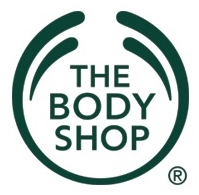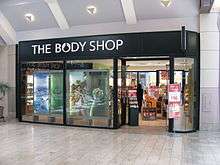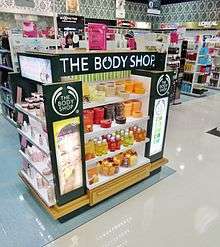The Body Shop
 | |
| Subsidiary | |
| Industry | Cosmetics |
| Founded | 26 March 1976 |
| Founder | Anita Roddick |
| Headquarters | Littlehampton, West Sussex, United Kingdom |
Number of locations | 2,605 (2010)[1] |
Key people | Anita Roddick |
| Products | Skin care |
| Parent | L'Oréal |
| Website |
www |

The Body Shop International plc, trading as The Body Shop, is a British cosmetics and skin care company owned by L'Oréal. It was founded in 1976 by Dame Anita Roddick and currently has a range of 1,200 products which it sells in 2,605 franchised stores in 61 countries.[2] The company is based in Littlehampton in West Sussex.
History
Origins
In 1970, Anita Roddick (then Anita Perella) visited "The Body Shop" housed in a car repairs garage in Berkeley, California selling naturally-scented soaps and lotions. The shop run by Peggy Short and Jane Saunders used natural ingredients, and helped to employ and train immigrant women. Six years later, in 1976, Roddick opened a similar shop in the UK, using the same business name, colour scheme, and cosmetic lines. In 1987, Roddick offered Short and Saunders $3.5 million to purchase the name "The Body Shop". [3][4][5] From its first launch in the UK in 1976, The Body Shop experienced rapid growth, expanding at a rate of 50 percent annually.

The Body Shop stock was floated on London's Unlisted Securities Market in April 1984, opening at 95p. After it obtained a full listing on the London Stock Exchange, the stock was given the nickname "The shares that defy gravity," as its price increased by more than 500%.
The Body Shop turned increasingly toward social and environmental campaigns to promote its business in the late 1980s. In 1997, Roddick launched a global campaign to raise self-esteem in women and against the media stereotyping of women. It focused on unreasonably skinny models in the context of rising numbers in bulimia and anorexia.
The opening of Roddick's first modest shop received early attention when the Brighton newspaper, The Evening Argus, carried an article about an undertaker with a nearby store who complained about the use of the name "The Body Shop."[6]
Sale to L'Oréal
In March 2006, The Body Shop agreed to a £652.3 million takeover by L'Oréal. It was reported that Anita and Gordon Roddick, who set up The Body Shop 30 years previously, made £130 million from the sale.[7]
There was a media controversy surrounding claims that L'Oréal continues to test on animals, which contradicts The Body Shop's core value of Against Animal Testing. L'Oréal states the company has not tested cosmetics on animals since 1989. Animal testing on cosmetics ceased for all cosmetic companies in Europe as well as cosmetics imports when the European Union passed legislation banning all testing for personal care products.[8] Since March 2013, the Group has taken another decisive step: The Group no longer tests on animal, anywhere in the world, and does not delegate this task to others. An exception could be made if regulatory authorities required it for safety or regulatory purposes.[9]
Roddick addressed the controversy over selling The Body Shop to the world's largest cosmetics company in an interview with The Guardian,[10] which reported that "she sees herself as a kind of "trojan horse" who, by selling her business to a huge firm, will be able to influence the decisions it makes. Suppliers who had formerly worked with the Body Shop will in future have contracts with L'Oréal, and working with the company 25 days a year Roddick was able to have an input into decisions."
Following her death in 2007, Prime Minister Gordon Brown paid tribute to Dame Anita, calling her "one of the country's true pioneers" and an "inspiration" to businesswomen. He said: "She campaigned for green issues for many years before it became fashionable to do so and inspired millions to the cause by bringing sustainable products to a mass market. She will be remembered not only as a great campaigner but also as a great entrepreneur."[11][12]
International expansion
| Year of opening | Country[13] |
|---|---|
| 1976 | UK |
| 1978 | Belgium |
| 1979 | Austria, Greece, Sweden |
| 1980 | Iceland, Canada |
| 1981 | Denmark, Ireland, Finland |
| 1982 | France, Netherlands |
| 1983 | Cyprus, Germany, Switzerland, Singapore, Australia |
| 1984 | Italy, Hong Kong, Malaysia |
| 1985 | Norway, Bahamas, Bahrain |
| 1986 | Portugal, Spain, Kuwait, Oman |
| 1987 | Malta, Antigua, Bermuda, Qatar, Saudi Arabia |
| 1988 | Gibraltar, United States, Taiwan |
| 1989 | Cayman Islands, New Zealand |
| 1990 | Indonesia, Japan |
| 1991 | Luxembourg |
| 1993 | Mexico, Brunei, Thailand, Macau |
| 1996 | Philippines |
| 1997 | Korea |
| 1999 | Romania |
| 2006 | India |
| 2014 | Brazil |
| 2016 | Morocco, China (Planned expansion) |
| 2016 | Sri Lanka |
Social activism
The social activism dimension of the company first evidenced in 1986 when The Body Shop proposed an alliance with Greenpeace in the UK to save the whales. Roddick began launching other promotions tied to social causes, with much public and media interest. The Body Shop regularly featured posters on shop windows and sponsorship of local charity and community events. Over time, Roddick blossomed into a full-time critic of business in general and the cosmetic industry in particular, criticising what she considered the environmental insensitivity of the industry and traditional views of beauty, and aimed to change standard corporate practices[14] Roddick said: "For me, campaigning and good business is also about putting forward solutions, not just opposing destructive practices or human rights abuses".[15]
The Body Shop instituted pioneering social audits in the mid-1990s, and continues to support its values[16][17] such as Community Trade,[18] reflecting its avowed practice of trading with communities in need and giving them a fair price for natural ingredients or handcrafts they purchase from these often marginalised countries. The first Community Trade activity in 1987 was a footsie roller which was supplied by a small community in Southern India (today known as Teddy Exports) and still a key CT supplier.[19] Since then, The Body Shop has found many trade partners in over 20 different countries that often are overlooked by the local as well as the global society.
Criticism has been made of the programme by fair trade activists. "The company's prominently displayed claims claim to pay fairer prices to the Third World poor but covered less than a fraction of 1 percent of its turnover", wrote Paul Vallely, the former chair of Traidcraft, in the obituary of Anita Roddick published in The Independent.
Policy on animal testing
The Body Shop web site explains that the organisation does not sell or use either finished products or ingredients that were tested on animals after December 31, 1990.[20] In October 2009, The Body Shop was awarded a 'Lifetime Achievement Award' by the RSPCA in Britain, in recognition of its uncompromised policy which ensures ingredients are not tested by its suppliers.
Community Trade (formerly Trade not Aid)
By 1991, The Body Shop's "Trade Not Aid" initiative with the objective of "creating trade to help people in the Third World utilise their resources to meet their own needs" had started a paper factory in Nepal employing 37 people producing bags, notebooks and scented drawer liners. Another initiative was a 33,000 square foot (3,000 square metre) soap factory in the depressed Glasgow suburb of Easterhouse, whose payroll included 100 residents.
Sometimes considered anti-capitalist or against globalisation, The Body Shop philosophy is in favour of international marketplaces. The chain uses its influence and profits for programmes such as Trade Not Aid, aimed at enacting fair labour practices, safe working environments and pay equality. According to The Body Shop, 65% of the company's products contained community traded ingredients by the end of 2008 and the company spent over $12 million on community trade ingredients in 2006.
In October 2009, The Body Shop invited employees, including a store manager from the UK to visit a supplier and see the benefits that the Community Trade programme has brought to a community in India.[21]
The Body Shop does not export its products to China, because cosmetics sold there have to be tested on animals, according to Roddick.[22] However, The Body Shop has always sourced many of its baskets and other non cosmetic supplies from China.
The Body Shop has undertaken periodic independent social audits of its activities.[23]
The Body Shop Foundation
The Roddicks founded The Body Shop Foundation in 1990, which supports innovative global projects working in the areas of human and civil rights and environmental and animal protection. It is The Body Shop International Plc's charitable trust funded by annual donations from the company and through various fundraising initiatives.[24] The Body Shop Foundation was formed to consolidate all the charitable donations made by the company. To date, The Body Shop Foundation has donated over £21 million sterling in grants. The Foundation regularly gives gift-in-kind support to various projects and organisations such as Children On The Edge (COTE).[25] Approximately 65% of the grants that the company funds come to nominations from the staff, consultants or franchisers attached to the company from all over the world.
Products

The Body Shop carries a wide range of products for the body, face, hair and home. The Body Shop claims its products are "inspired by nature" and they feature ingredients such as marula oil and sesame seed oil sourced through the Community Fair Trade program.
In 2010, The Body Shop produced its first ECOCERT certified organic skincare line, Nutriganics. Following the launch of Nutriganics, The Body Shop reformulated their hair line to contain no colourants (Rainforest Hair Care), and produced a new line of deodorants that contain no aluminium salts, and use volcanic minerals as a substitute.
Products include:
- Body Butters (including Moringa, Satsuma, Strawberry, Olive, Shea, Mango and Coconut)
- Body products such as body scrub, body butter and bath lilies
- Make Up (including mascara, lipstick, lip gloss, eye shadow and cotton rounds)
- Full skin care ranges (including Tea tree, Vitamin C, Vitamin E, Aloe vera and Seaweed)
- Pediatrician approved baby range
- Men's skin care (Including maca root and white musk)
- Hair care (including their famous Banana shampoo and Banana conditioner)
- Fragrances (Women's and Men's)
- Bath products including shower gels and solid soaps
Controversies
- The September 1994 investigative article "Shattered Image: Is The Body Shop Too Good to Be True?,[26] " written by Jon Entine and published in Business Ethics magazine, created an international controversy and led to dozens of stories in the international media, including articles on The New York Times' business section front page and on ABC World News Tonight. A flurry of news reports led to a temporary 50% drop in the market value of the stock of the company, which until that point had been considered a model "socially responsible" company.
- Entine reported that Anita Roddick, founder of Body Shop International (BSI) in the UK, had stolen the name, store design, marketing concept and most product line ideas from The Body Shop[3][4][5] founded in 1970 in Berkeley, California by Peggy Short and Jane Saunders who started the French-style perfume store, where customers could do their own blending. Roddick subsequently fabricated her story of travelling around the world discovering exotic beauty ingredients. In 1989, Roddick purchased the US and Israeli rights to The Body Shop name, and the Berkeley-based chain of five stores renamed itself Body Time.
- Roddick's unsubstantiated claims and inaccurate reports in popular articles and even some university case studies that Roddick's The Body Shop "gave most of its profits to charity", documents from Britain's Charity Commission showed that Roddick's company gave nothing to charity over its first 11 years and was penurious in its philanthropy thereafter. The Body Shop also faced millions of dollars in claims by disenchanted franchisees.
- Entine referred to The Body Shop's marketing as "greenwashing," which was one of the first uses of that term. The article in Business Ethics (now defunct), which was cited with a National Press Club Award for Consumer Journalism in 1994, is still widely used in university business ethics classes and is generally credited with prompting companies claiming to be socially responsible to match their claims with operational practices and to increase transparency.
- The "Shattered Image" article had originally been scheduled to be published as a 10,000 word feature in Vanity Fair earlier in 1994 but was dropped after legal threats by The Body Shop. The original article was eventually published in 2004 by The Nation Books in Killed: Great Journalism Too Hot to Print,[27] edited by David Wallis. Business Ethics, which had featured Roddick on its cover just the year before, subsequently agreed to print a much shorter version of the exposé.
- In April 2013 it was revealed that The Body Shop was charging Irish consumers up to 33% more than their London counterparts.[28]
- The Body Shop does not recognise trade union membership.[29]
References
- ↑ "L'Oréal 2010 financial statements, Management Report of the Board of Directors, Annual Financial Report and additional information". Retrieved 9 December 2011.
- ↑ "About us | Our Company". The Body Shop. 29 October 2008. Retrieved 9 December 2011.
- 1 2 "History".
- 1 2 "Body Flop: Anita Roddick proclaimed that business could be caring as well as capitalist, by Jon Entine, The Globe and Mail Report on Business Magazine". Jonentine.com. 31 May 2002. Retrieved 9 December 2011.
- 1 2 "Made In Berkeley: Berkeley's Body Time the Original Body Shop. Category: Features from". The Berkeley Daily Planet. Retrieved 9 December 2011.
- ↑ "Dame Anita Roddick". Growing Business. Retrieved 9 December 2011.
- ↑ "L'Oreal buys Body Shop for £652m". The Independent. London. 17 March 2006. Retrieved 25 May 2010.
- ↑ Booth, Robert (17 March 2006). "Activists call Body Shop boycott". The Guardian. London.
- ↑ "The Question of Animal Testing". L'Oreal. Retrieved 2016-03-13.
- ↑ The Guardian. Interview: Anita Roddick, Body Shop founder
- ↑ "Dame Anita Roddick dies aged 64". BBC News. 10 September 2007. Retrieved 25 May 2010.
- ↑ About The Body Shop Story from Encyclopedia of Leadership, Volume 4. Books.google.com. Retrieved 9 December 2011.
- ↑ http://web.archive.org/web/20050305142901/http://www.thebodyshopinternational.com/templates/global/images/ra98.pdf
- ↑ http://www1.umn.edu/humanrts/links/bodycode.html
- ↑ "The Body Shop". The Body Shop. 25 February 2011. Retrieved 9 December 2011.
- ↑ "The Body Shop: Our Values". Retrieved 30 April 2006.
- ↑ "The Body Shop: Values Report". Retrieved 30 April 2006.
- ↑ "The Body Shop: Values Report, Community Trade Principles" (PDF). Retrieved 30 April 2006.
- ↑ "The Body Shop® - Natural Products Inspired by Nature".
- ↑ "Against Animal Testing Policy" (PDF). Retrieved 14 September 2011.
- ↑ "Nicola will be no stranger to fair trade (From This Is Cheshire)". Thisischeshire.co.uk. 22 October 2009. Retrieved 9 December 2011.
- ↑ "BBC: The Magazine Monitor". BBC News. 16 December 2005. Retrieved 9 December 2011.
- ↑ "The Body Shop Values Report".
- ↑ "The Body Shop Foundation". The Body Shop Foundation. Retrieved 9 December 2011.
- ↑ "Home".
- ↑ "The Body Shop: Jon Entine writes on sustainability, corporate responsibility, DNA, race, and Jewish identity". Jonentine.com. Retrieved 9 December 2011.
- ↑ ISBN 1-56025-581-1
- ↑ Kelleher, Lynne (2 April 2013). "Irish shoppers pay 33% more than London counterparts". Irish Examiner. Retrieved 5 May 2014.
- ↑ "What's Wrong With The Body Shop?". McSpotlight. 8 May 1997. Retrieved 9 December 2011.
External links
| Wikimedia Commons has media related to The Body Shop. |